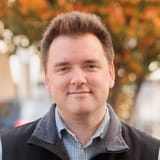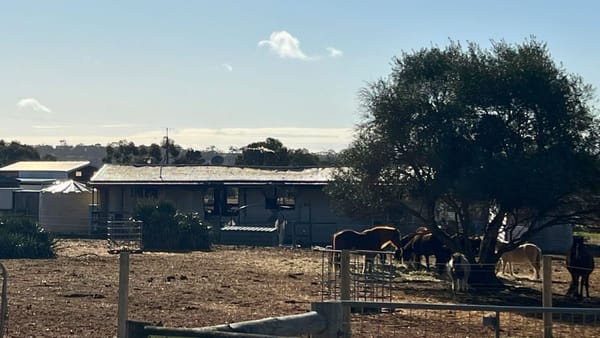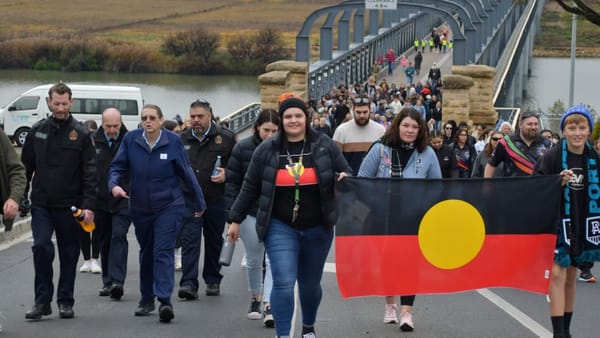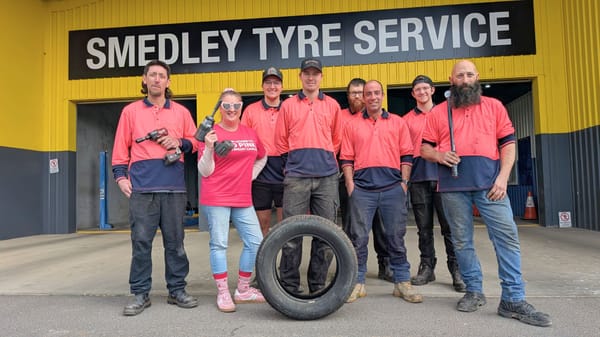‘If it wasn’t for you guys I’d be dead or in jail’
A recovered drug addict talks about his journey through the Murray Mallee GP Network's Matrix Program for Mental Health Awareness Month.

October is Mental Health Awareness Month. This is the fourth in a series of free-to-read stories about looking after ourselves and the people around us, and seeking help when we need it. We all have a role to play. Please consider supporting this series by subscribing.

Not so long ago, Daniel* expected to end up in jail or dead.
He dealt cannabis and regularly used cocaine.
His world was filled with false friends, people he said hung around him just to see what they could get for nothing.
He pointed to his forehead with a weathered finger: he hadn’t been thinking with the front part of his brain, the logical part, he said, but with “the drug part of my brain, making irrational, stupid decisions”.
Sometimes he’d stop using for a while, a few years even, but he kept relapsing.
Then a friend made a suggestion: go see a GP and get a referral to something called the Matrix Program, a support group for people dealing with heavy drug dependence.
That was a year or two ago.

“I was hesitant at first,” he said.
“I thought ‘how are they going to help me?’.”
But he went along with it, three days a week for four months.
Now, at 41 years of age, Daniel says he is a changed man.
He leans forward, speaking urgently: the program helped him get off the drugs, then booze as well.
He got some work: “everyone says no-one gives you a chance when you’ve been a drug addict, but that’s a lie”.
He started eating healthier, and rebuilt his relationships with his kids; when he graduated from the program, three of them came along.
“I had no future, no plans; now I’m starting to plan a bit more,” he said.
“They (the Murray Mallee GP Network) are helping me integrate back into society.
“Back then I didn’t want to integrate into society; I wanted to go home, shut the doors and hide.
“With this new s***, this ice ... there needs to be more programs like this.”
How do you help someone with a drug dependency?
Don’t enable them, Daniel said.
Don’t give them cash; if they’re hungry, bring them food.
Wait for them to want help, and be there when they do.
Don’t accuse them of being an addict, just say you’ll be there to support them if they ever want to change their ways.
Daniel said he wasn’t ashamed to use the word “addict” to describe himself any more – he lived one day at a time, and if he could get through the day clean, that was all he cared about.
When he relapsed at a birthday party last year, the mates he’d made through the program helped him get back on the horse again.
“Since July of last year I’ve been clean, off all the drugs,” he said.
“I haven’t had a drink since December and I feel great.
“I eat healthier, I have a good lifestyle.”
Nowadays, if he’s at a party and people start using, he walks away.

It hasn’t all been smooth sailing over the past few years – his father’s death filled him with grief, his marriage broke up and a back injury put him off work.
He still had anxiety to deal with, he said, but he knew to avoid the places or situations that might trigger it.
“If I have a bad anxiety day, I can’t come here to Murray Bridge; I’ll drive all the way to Mount Barker to do my shopping,” he said.
“It sounds stupid, but ... if I’ve got to do that, I’ve got to do it for my peace of mind.”
More people needed to become aware of their mental health and the need to maintain it, he said.
Almost everyone suffered at some point.
But there was always a way out, no matter how unlikely it seemed.
“If my story could help one person out there, change one person’s life for the better, I’ve done something with my life,” he said.
“That brings me so much joy.
“You can’t help everyone in life, but if one person can hear my story and say ‘f***, I need help, I’m gonna get help tomorrow’, it makes my life worth living.”
- Get help: Talk to your GP; visit www.mmgpn.org.au, call 8531 1303, email reception@mmgpn.org.au or visit the Murray Mallee GP Network at 55 Adelaide Road, Murray Bridge between 8.30am and 5pm weekdays; or call the National Alcohol and Other Drug Hotline on 1800 250 015.
Previous Mental Health Awareness Month stories:
- “Yoga’s a way to get to your mind through your body”
- Better wellbeing starts today – just follow the trail around Murray Bridge
- Pony program helps participants clip-clop their way to wellbeing
The subject’s name was changed for this story at his request.
You can help keep local stories like this one free for everyone to read. Subscribe to Murray Bridge News today and support your independent, locally owned news service, plus get access to exclusive stories you won’t find anywhere else, for just $5.50 a month.





